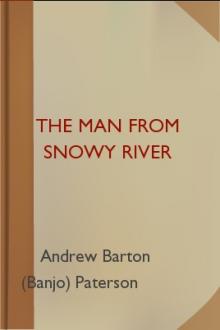The Young Forester, Zane Grey [good books for 8th graders .TXT] 📗

- Author: Zane Grey
Book online «The Young Forester, Zane Grey [good books for 8th graders .TXT] 📗». Author Zane Grey
“There! You'd hardly think that that great tree was killed by a lot of little bugs, would you? They girdle the trees and prevent the sap from flowing.”
I found an old chestnut which contained nests of the deadly white moths, and explained how it laid its eggs, and how the caterpillars that came from them killed the trees by eating the leaves. I showed how mice and squirrels injured the forest by eating the seeds.
“First I'd cut and sell all the matured and dead timber. Then I'd thin out the spreading trees that want all the light, and the saplings that grow too close together. I'd get rid of the beetles, and try to check the spread of caterpillars. For trees grow twice as fast if they are not choked or diseased. Then I'd keep planting seeds and shoots in the open places, taking care to favor the species best adapted to the soil, and cutting those that don't grow well. In this way we'll be keeping our forest while doubling its growth and value, and having a yearly income from it.”
“Kenneth, I see you're in dead earnest about this business,” said my father, slowly. “Before I came out here today I had been looking up the subject, and I believe, with you, that forestry really means the salvation of our country. I think you are really interested, and I've a mind not to oppose you.”
“You'll never regret it. I'll learn; I'll work up. Then it's an outdoor life—healthy, free—why! all the boys I've told take to the idea. There's something fine about it.” “Forestry it is, then,” replied he. “I like the promise of it, and I like your attitude. If you have learned so much while you were camping out here the past few summers it speaks well for you. But why do you want to go to Arizona?”
“Because the best chances are out West. I'd like to get a line on the National Forests there before I go to college. The work will be different; those Western forests are all pine. I've a friend, Dick Leslie, a fellow I used to fish with, who went West and is now a fire ranger in the new National Forest in Arizona—Penetier is the name of it. He has written me several times to come out and spend a while with him in the woods.”
“Penetier? Where is that—near what town?”
“Holston. It's a pretty rough country, Dick says; plenty of deer, bears, and lions on his range. So I could hunt some while studying the forests. I think I'd be safe with Dick, even if it is wild out there.”
“All right, I'll let you go. When you return we'll see about the college.” Then he surprised me by drawing a letter from his pocket and handing it to me. “My friend, Mr. White, got this letter from the department at Washington. It may be of use to you out there.”
So it was settled, and when father drove off homeward Hal and I went back to camp. It would have been hard to say which of us was the more excited. Hal did a war dance round the campfire. I was glad, however, that he did not have the little twinge of remorse which I experienced, for I had not told him or father all that Dick had written about the wilderness of Penetier. I am afraid my mind was as much occupied with rifles and mustangs as with the study of forestry. But, though the adventure called most strongly to me, I knew I was sincere about the forestry end of it, and I resolved that I would never slight my opportunities. So, smothering conscience, I fell to the delight of making plans. I was for breaking camp at once, but Hal persuaded me to stay one more day. We talked for hours. Only one thing bothered me. Hal was jolly and glum by turns. He reveled in the plans for my outfit, but he wanted his own chance. A thousand times I had to repeat my promise, and the last thing he said before we slept was: “Ken, you're going to ring me in next summer!”
II. THE MAN ON THE TRAIN
Travelling was a new experience to me, and on the first night after I left home I lay awake until we reached Altoona. We rolled out of smoky Pittsburg at dawn, and from then on the only bitter drop in my cup of bliss was that the train went so fast I could not see everything out of my window.
Four days to ride! The great Mississippi to cross, the plains, the Rocky Mountains, then the Arizona plateaus-a long, long journey with a wild pine forest at the end! I wondered what more any young fellow could have wished. With my face glued to the car window I watched the level country speed by.
There appeared to be one continuous procession of well-cultivated farms, little hamlets, and prosperous towns. What interested me most, of course, were the farms, for all of them had some kind of wood. We passed a zone of maple forests which looked to be more carefully kept than the others. Then I recognized that they were maple-sugar trees. The farmers had cleaned out the other species, and this primitive method of forestry had produced the finest maples it had ever been my good-fortune to see. Indiana was flatter than Ohio, not so well watered, and therefore less heavily timbered. I saw, with regret, that the woodland was being cut regularly, tree after tree, and stacked in cords for firewood.
At Chicago I was to change for Santa Fe, and finding my train in the station I climbed aboard. My car was a tourist coach. Father had insisted on buying a ticket for the California Limited, but I had argued that a luxurious Pullman was not exactly the thing for a prospective forester. Still I pocketed the extra money which I had assured him he need not spend for the first-class ticket.
The huge station, with its glaring lights and clanging bells, and the outspreading city, soon gave place to prairie land.
That night I slept little, but the very time I wanted to be awake—when we crossed the Mississippi—I was slumbering soundly, and so missed it.
“I'll bet I don't miss it coming back,” I vowed.
The sight of the Missouri, however, somewhat repaid me for the loss. What a muddy, wide river! And I thought of the thousands of miles of country it drained, and of the forests there must be at its source. Then came the never-ending Kansas corn-fields. I do not know whether it was their length or their treeless monotony, but I grew tired looking at them.
From then on I began to take some notice of my fellow-travelers. The conductor proved to be an agreeable old fellow; and the train-boy, though I mistrusted his advances because he tried to sell me everything from chewing-gum to mining stock, turned out to be pretty good company. The Negro porter had such a jolly voice and laugh that I talked to him whenever I got the chance. Then occasional passengers occupied the seat opposite me from town to town. They were much alike, all sunburned and loud-voiced, and it looked as though they had all bought their high boots and wide hats at the same shop.
The last traveller to face me was a very heavy





Comments (0)